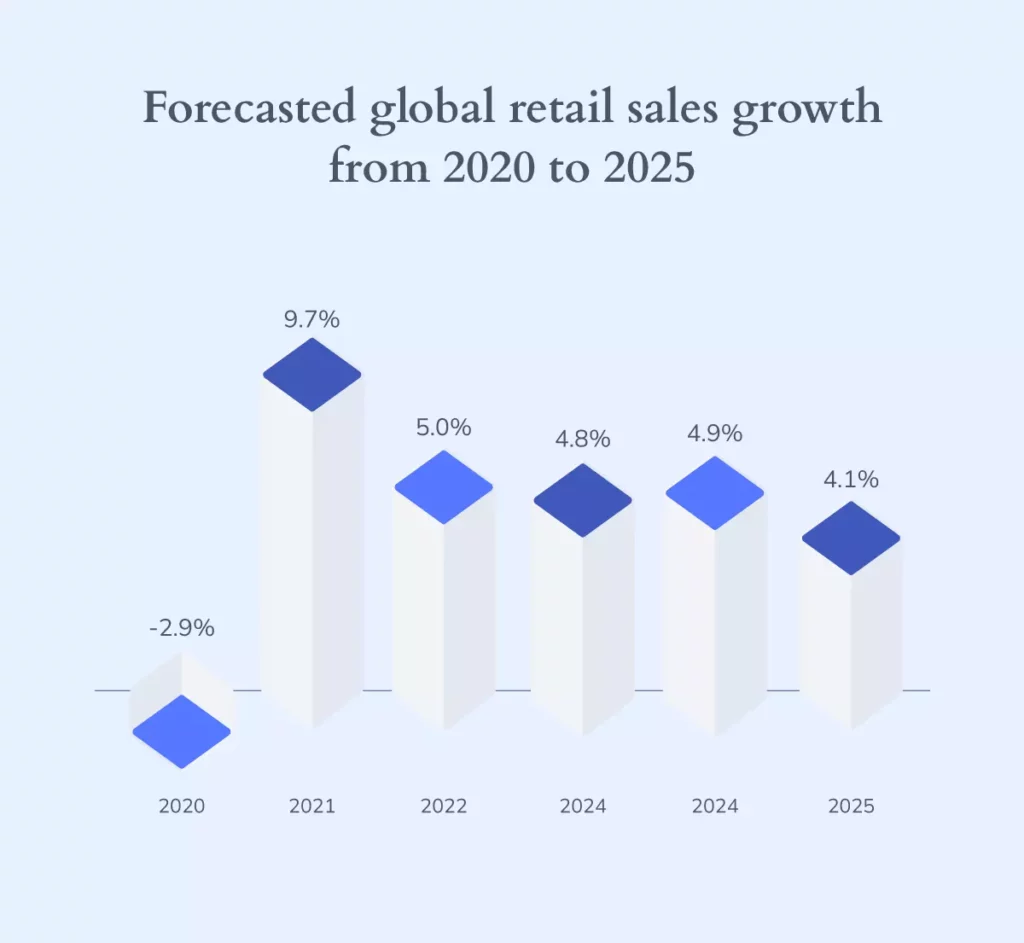As the global retail industry evolves, businesses face exciting opportunities and complex challenges. From managing multiple currencies to streamlining invoicing processes, the demand for potent, adaptable solutions is at an all-time high. This article explores how an innovative fintech platform is conquering these challenges, providing B2B banking, payments, and invoicing solutions that are revolutionizing the retail industry and empowering retailers to flourish in the global marketplace.
Overview of the Global Retail Landscape
The global retail landscape is rapidly changing, shifting consumer behaviors. The rise of e-commerce platforms, mobile shopping, social media marketing, and AI-driven customer service are just a few examples of digital innovations transforming the retail industry. Consumers now have the freedom to shop from the comfort of their homes, compare prices across different platforms, and voice their opinions about products and brands on social media. This has given birth to a new kind of consumer – one that is informed, connected, and demanding personalized experiences.
In response to these changes, retailers are having to rethink their business models. Brick-and-mortar stores are no longer the only avenue for selling products. Instead, retailers are embracing digitization by creating omnichannel experiences, combining offline and online touchpoints to engage customers and boost sales. They are venturing beyond their local markets and expanding their operations globally to tap into new customer segments and revenue streams.
The retail market presents lucrative opportunities. The chart below illustrates that the current growth rate and the projected one through 2025 surpass the pre-pandemic levels. Nevertheless, global expansion is full of challenges regarding financial operations and management. Given the market volatility and emerging financial difficulties, one cannot help but wonder how the retail industry can sustain this growth rate.

Financial Challenges in the Retail Industry
Retailers, particularly those with international operations, are presented with numerous opportunities to enhance their financial management skills. However, the complexity of managing finances increases as businesses expand their global reach. Here are 5 key challenges that retailers frequently engage with:
1. Managing Multiple Currencies
As retailers expand their businesses into different countries, they inevitably have to deal with multiple currencies. This introduces complexity in terms of exchange rates, conversion costs, and fluctuating values. Retailers must keep track of the changing rates and adjust their pricing strategies to ensure profitability. Moreover, they must comply with local financial regulations, which can vary significantly from one jurisdiction to another.
2. Handling International Payments
International payments can be a source of significant friction and cost. Retailers often need to deal with various intermediaries, each charging their own fees, leading to increased operational costs. There can also be delays in the receipt of payments due to the involvement of multiple parties, thereby affecting cash flow. Retailers need a streamlined process to handle international transactions efficiently and cost-effectively.
3. Complex Invoicing Processes
Invoicing is crucial to financial operations: It must be accurate and timely. However, creating and sending invoices manually can be time-consuming and prone to human error. Retailers need to automate this process as much as possible to increase efficiency and accuracy. Additionally, different jurisdictions have different invoicing requirements, adding to the complexity of managing this process internationally.
4. Cash Flow Management
Cash flow management is critical to the survival and growth of any business. Retailers must ensure a steady cash flow to meet operating expenses, invest in growth initiatives, and maintain a buffer for unexpected costs. However, managing cash flow becomes more complex with international operations due to currency fluctuations, extended payment cycles, and unpredictable operating costs in different markets.
5. Supply Chain Disruptions
Supply chain disruptions, caused by various factors, create unpredictability in goods availability and pricing. This volatility can significantly impact a retailer’s bottom line. Retailers need help with inventory management and increased costs, often needing to invest in alternative strategies like local sourcing or digital transformation. Furthermore, prolonged supply chain issues can erode customer trust and loyalty, leading to potential long-term revenue losses.
Retail businesses need robust, flexible, and efficient solutions to overcome these challenges. Innovative fintech platforms like Bancoli have the potential to effectively address these needs, leading to improved efficiencies and unearthed opportunities.

Bancoli: Designed for Retail
Operating on a global scale, Bancoli delivers B2B banking, payments, and invoicing solutions designed to mitigate the financial challenges encountered by the retail industry. The platform equips businesses with extensive features that simplify operations and amplify business growth.
Global Business Account | Simplifying International Payments
Bancoli’s Global Business Account (GBA) is designed to handle multiple currencies seamlessly. It simplifies international transactions, allowing businesses to receive payments globally with less friction and at lower costs. Moreover, with Bancoli’s GBA, companies can manage their global operations more efficiently, potentially increasing profits.
Invoicing Made Simple
Invoicing can be a complex and time-consuming process for retail businesses. Bancoli’s e-invoicing solution simplifies this process through automation, reducing manual errors and saving valuable time. Bancoli’s guaranteed invoices offer a seamless invoicing experience, allowing businesses to cut costly credit card processing fees and secure earnings.
Accelerated Cash Flow
Effective cash flow management is crucial in the retail industry. Bancoli provides tools for early payments and increased cash flow, enabling businesses to manage their funds better. By improving cash flow management, businesses can ensure they have the necessary resources to invest in growth and innovation.
Bancoli Client Success Stories: A Leader in Medical Commodity Retailing
Bancoli’s solutions have been well received by its retail clients. One customer, a retail business specializing in medical commodities, noted that Bancoli’s Global Business Account has significantly simplified their international transactions, saving them both time and money. Moreover, for this client, the convenience of bringing their suppliers onto Bancoli has further strengthened their business relationships because they can now streamline their processes and enjoy mutual benefits.
It is very important for us to take care of our business relationships. They are part of our success. As we import many of the products that we commercialize in our country and other regions, it is essential that we have sufficient inventory in stock and that orders arrive on time.
Bancoli’s Global Business Account has helped us a lot. It allows us to receive invoices from our customers from any country and in any currency, and we can pay them immediately. It is very convenient for us to be able to do business in any currency in one bank account.
It was not long before we realized the benefits of Bancoli’s cash flow acceleration tools. Since we and our partners use Bancoli, they offer early payment discounts that benefit both parties, and we yield on every transaction.

Conclusion: Wrapping up the benefits of Bancoli for the retail industry
In the evolving global retail landscape, businesses need financial solutions to keep pace. Bancoli’s offerings provide the retail industry with the tools to streamline financial operations. From managing multiple currencies and simplifying invoicing to effective cash flow management, Bancoli is the retail industry’s partner for global business operations.




